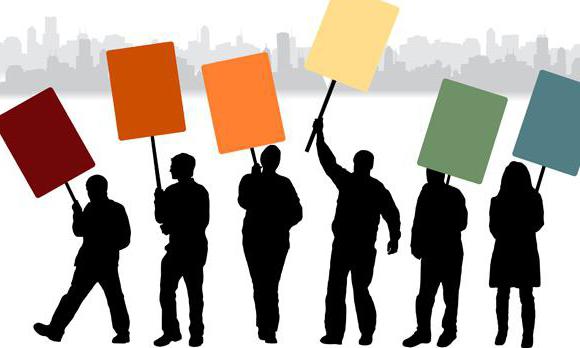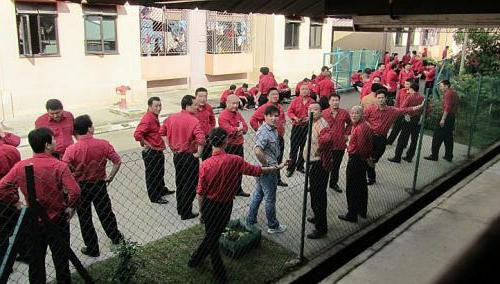Despite all the possible conciliation procedures that exist in enterprises, they do not always bring a positive result. That is why the Constitution of the Russian Federation recognizes the right to strike by employees of the enterprise.
Definition
Temporary voluntary deviation of an employee from the performance of his labor duties to resolve a collective labor dispute implies the concept of a strike. The right to strike is determined by the Constitution of the Russian Federation and the Labor Code of the Russian Federation.

Participation in it can only be voluntary. You can not force workers to hold strikes, threaten them in case of refusal to participate in the event.
A person who forces an employee to participate in a strike or, conversely, to refuse to participate, may be held liable (including criminal).
Warning strike
By a precautionary strike is meant a campaign, which is a demonstration of the employees of the enterprise of their readiness to achieve established requirements at all costs. This type of strike can be declared during the reconciliation process. You can use it once in the process of collective disputes. Moreover, the duration of such a strike cannot be more than an hour.

The decision on a precautionary strike is taken by the representative body of employees who is involved in the conciliation process. He leads the strike and must provide the necessary services.
Constitutional formula
The constitutional formula, which determines the right to strike in the Russian Federation, includes:
- Acceptance of the strike as a legitimate action by employees.
- Enforcing the right to strike through the creation of a system of state guarantees.
- The adoption of the strike as a means of resolving a collective labor dispute.
- Shifting the established legal strike regime to the federal government.
The Constitution of the Russian Federation characterizes the right to strike as a connection between collective actions in defense of their rights and the exercise of other labor rights that they have.
Legal Opportunities
A strike has an individual aspect - voluntary decision-making on participation or non-participation in this event.

The right of workers to strike implies the presence of such legal aspects as:
- Free discussion of the possibility of holding a strike and deciding on its announcement.
- Free decision on the form of the event, the requirements put forward, ensuring the implementation of the necessary services.
- Unimpeded conduct of the event, ensuring public order and non-violation of the rights of others.
- Suspension or termination of the strike by decision of the authorized body.
- Use of guarantees provided by law.
When a strike is possible
Labor law determines the possibility of a strike in such cases when:
- the conciliation process did not lead to a positive result;
- the employer or his representatives do not agree;
- the employer does not comply with the terms of the agreement that was reached in the process of a collective dispute;
- the decision of the labor arbitration is not executed.
All of these conditions give employees the right to go on strike. At the same time, representatives of the leading side have no right to organize a strike and, all the more, take part in it.
Illegal strikes
Restriction of the right to strike is imposed:
- When martial law or a state of emergency is introduced or special measures are used taking into account legislation on emergency situations.
- In the armed forces of the Russian Federation and other militarized bodies that are responsible for ensuring the country's defense, state security, emergency rescue operations, search operations, and the elimination of natural disasters.
- In law enforcement.
- In organizations that serve hazardous types of production, at ambulance stations or emergency medical care.
- In organizations that ensure the livelihoods of the population.
- When a strike can threaten a country's defense, state security, life and public health.

The right to strike may be limited by federal law. For example, strikes are unacceptable for civil servants of the Federal State Service.
Strike decision
Labor law permits a strike decision to be taken at a meeting of employees at the proposal of their representative body, which was previously elected to resolve collective disputes in the workplace.
The decision on the participation of employees in the strike, which is announced by the trade union, is taken at a meeting of the organization’s employees without a conciliation process.
Such a meeting of employees is legal if it is attended by 50% of the total number of employees. The employer must provide the team with premises for the meeting and cannot interfere with the meeting.

A decision can be considered adopted if half the employees present at the meeting cast their votes for it. If the meeting cannot be held, the authorized body can approve its decision by collecting signatures in support of the strike.
A conciliation commission must work within five days, which can announce a preliminary strike in writing no later than three days before it begins.
The employer must be notified in writing of ten days in advance of the strike.
What is indicated in the decision
The decision giving the right to strike must contain:
- list of disagreements of the parties to the dispute;
- date and time of the event, the expected duration and number of participants (the strike must begin within 60 days from the date of its announcement);
- the name of the body that leads the strike, the composition of representatives of employees who participated in the reconciliation process;
- list of proposals for minimum services to be carried out during a strike.
The employer must warn the relevant state body for the settlement of collective disputes about the planned strike.
If the strike does not start on time, then the subsequent resolution of the conflict should be carried out in accordance with Art. 401 of the Labor Code of the Russian Federation (conciliation procedures).
Who leads
The strike is led by a representative body of employees. He can convene a meeting, receive from the employer the necessary information that affects the interests of the team, attract specialists who prepare opinions on controversial issues.
The representative body may receive the right to strike (the procedure for holding it must be familiar to him), as well as this person has the right to suspend the event.

If it is necessary to resume the strike, it is not necessary to reconsider the dispute. It is enough to warn the employer and the relevant state agency about this in three days.
During the strike itself, both parties must continue to resolve the conflict through conciliation procedures.
Guarantees
For what purpose is the right to strike given? In order to defend the interests of the striking party and resolve the controversial situation, as a result of which the strikers are also given certain guarantees. These include:
- Participation in a strike is not considered a violation of labor discipline and is not grounds for dismissal of an employee. An exception are situations when the employee was denied the cessation of the strike.
- The prohibition of disciplinary action against persons participating in a strike.
- Retention of work and position for the employee during the strike.
- Possible compensation payments to persons participating in the strike (if this fact is indicated in the collective agreement).
- Participation in a strike is not considered a violation of discipline.
But, based on the fact that workers do not fulfill their obligations during the strike, the employer has the right not to pay them salaries. Also, those who do not participate in the strike, but for well-known reasons cannot do their job, must notify the leader in writing. The employer, in turn, can transfer such employees to another job.
Cancel or reschedule a strike
A strike may be declared unlawful by decision of the Supreme Court at the request of the head of the organization or the prosecutor's office. This decision should be communicated to employees by an authorized person.
If the strike threatens the life and health of people, the court should either postpone it for a month or postpone it for the same period. In special cases, the Government of the Russian Federation has the right to suspend the strike until the court resolves the relevant issue, but for no more than 10 days.

In the process of resolving a conflict situation, it is forbidden to lockout (dismissal of employees for their participation in the strike).
Duties of the parties
The right to strike gives its participants not only the opportunity to demand the fulfillment of certain conditions, but also to observe certain obligations:
- During the strike, the parties must continue to resolve the collective dispute through conciliation proceedings.
- Persons who lead the strike must provide its participants with security measures, maintain public order, protect the property of the enterprise, and also stop equipment that could threaten the life and health of the strikers.
- Those organizations that ensure the safety of people and their interests, during strikes should provide a minimum of work. If this minimum is not met, then the strike will be considered illegal.
A responsibility
The right to strike and its implementation are regulated by the Labor Code of the Russian Federation and the Constitution of the Russian Federation. And what is the responsibility for unauthorized and illegal strikes? There are several types of sanctions:
- Disciplinary punishment. This type of liability is provided for by Art. 417 of the Labor Code of the Russian Federation. Employees who started a strike or did not stop it the day after the decision was communicated to the authorized body may be subject to disciplinary action, and the strike itself is considered illegal.
- Administrative responsibility. This type of punishment is provided for by Art. 20.26 Administrative Code of the Russian Federation. According to the article, if work is stopped arbitrarily and this action is not provided for by law, then a fine of up to 1,500 rubles is imposed on the employee. Accordingly, if the strike is completed on time or not started at all, such actions have no administrative consequences.
- Civil liability. This type of punishment is provided only for trade union organizations that declared and did not stop the strike after it was declared unlawful. Such organizations must reimburse all losses incurred by the enterprise caused by the organized strike. The organization must compensate at its own expense and in the amount determined by the court.
- Criminal liability. This type of punishment for an illegal strike is not provided for in the Criminal Code of the Russian Federation, but practice shows that a criminal case can be instituted, for example, under Art. 315 of the Criminal Code is a malicious failure by representatives of the authorities, civil servants, employees of local self-government bodies, and heads of commercial organizations of a court decision that has entered into legal force. In this case, non-execution is equated to obstructing the enforcement of the court decision.Actually, the authorized body can be charged under this article if a court decision to declare the strike unlawful is made and the event continues.
Today, there is practically no liability for holding a strike for the authorized person who is responsible for the specified event. But there is a possibility of holding an employee accountable for participating in a strike. Both legal legal methods and a peculiar “punishment” of the strikers can be used.
In addition, the employer can indirectly punish striking employees, which for the latter is a more painful procedure than official methods.
It is worth remembering that almost any conflict can be resolved through conciliatory negotiations. No need to immediately resort to strikes or more radical methods. To work in a team as usual, both parties must learn to listen and hear each other.